25 years ago today and 5 years after that, Eric Clapton and his friends auctioned off over a hundred of their guitars through Christie’s Auction House to raise money for the Crossroads Center at Antigua, a drug and alcohol rehabilitation clinic founded by Clapton. In total, $5 million was raised during the 1999 edition, and over $7 million during the 2004 edition. READ some more about which guitars were sold… (1999, 2004)
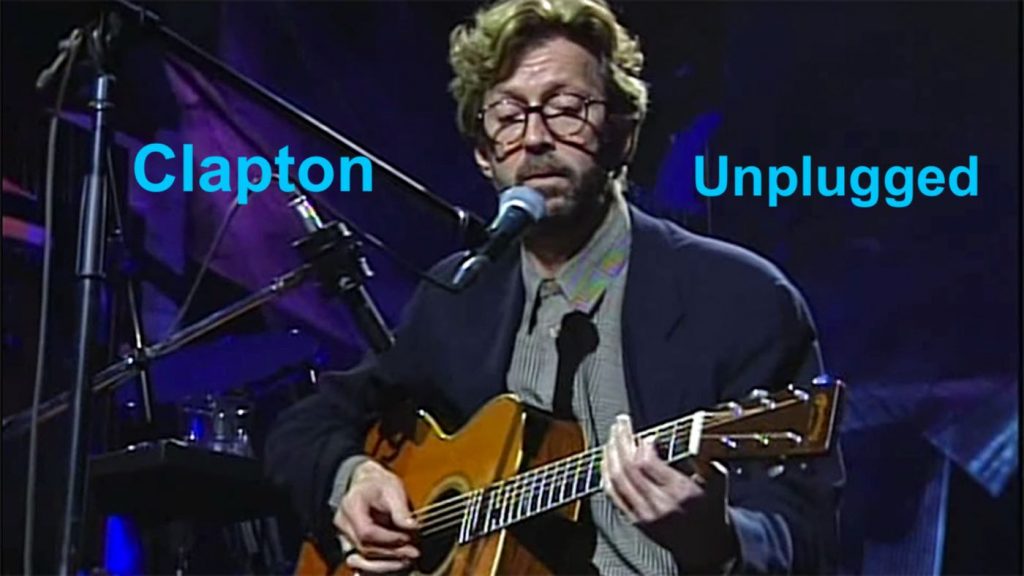
The guitar which earned the most interest was Eric Clapton’s legendary Fender Stratocaster, Blackie. It sold for a staggering $959,500. This sale held the distinction of the most money paid at auction for a guitar of the rock era but was surpassed in later years.
Lot 41, Eric’s beloved Cherry Red ES335-TDC came in second selling for $847,500, the world record for a Gibson guitar at that time. Rounding out the top 3 was Lot 19, the 1939 acoustic Martin 000-42 which Clapton played on MTV Unplugged. It garnered $791,500—the record for a Martin guitar at the time.
Other guitars were donated for the fundraiser by such rock and roll legends as Brian May, Sonny Landreth, Pete Townsend, Pat Matheny, Roger Waters, Steve Vai, Joe Satriani, Albert Lee, Mark Knopfler, Carlos Santana, and Jimmy Page.
MORE Good News on this Day:
- Margaret Brent, a niece of Lord Baltimore, was ejected from the Maryland Assembly after demanding a place and vote in the legislative body (1647)
- President Vladimir Putin arrived in London on the first state visit to Britain by a Russian leader since the 19th century (2003)
- Pirates of the Caribbean: Dead Man’s Chest, starring Johnny Depp, Keira Knightley and Orlando Bloom, premiered—and became the fastest film to gross over $1 billion (2006)
- Australia swore in its first female Prime Minister, Julia Gillard, after she became the Leader of the Australian Labor Party at the group’s leadership election – and the first female in that position (2010)
- New York became the sixth and largest state in the country to legalize gay marriage (2011)
43 years ago, the Humber Bridge became the world’s longest single-span suspension bridge when it was inaugurated over the waters of the Humber Estuary formed by the rivers Trent and Ouse. Connecting Barton-upon-Humber on the south bank and Hessle on the north bank, connecting the East Riding of Yorkshire with North Lincolnshire, the building is listed as Grade 1.
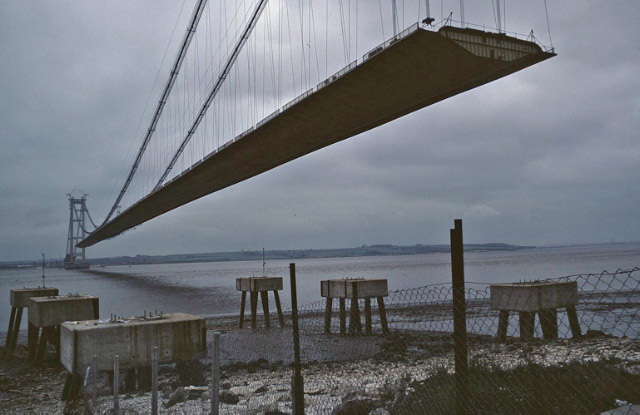
Before the bridge was erected, the journey to the only crossing point was along straight single-carriageway roads across foggy moors interrupted by bottlenecks for most of the journey to Blyth, Nottinghamshire, where it met the A1, and the accident rate was high.
Plans for a bridge were drawn up in the 1930s and revised in 1955, but work did not begin until 1972. Engineer Bernard Wex, OBE, designed the bridge that would be built. The towers were constructed by slipforming, a method of pouring concrete continuously into a moving frame.
Each cable weighs 5,500 tons, made up of 37 strands of 404 lengths of cable. The cable on the northern span has four extra strands. Each cable can take a load of 19,400 tons.
With a center span of 1,410 m (4,630 ft; 0.88 mi) and a total length of 2,220 m (7,280 ft; 1.38 miles), the Humber Bridge was the longest single-span suspension bridge in the world for 17 years, until the Akashi Kaikyō Bridge opened in Japan on 5 April 1998. (1981)
29 years ago today, South Africa defeated New Zealand in the Final of the 1995 Rugby World Cup. Nelson Mandela presented the trophy to captain Francois Pienaar in a famous post-apartheid moment that was turned into a big-budget Hollywood film Invictus, starring Matt Damon as Pienaar and Morgan Freeman as Mandela.
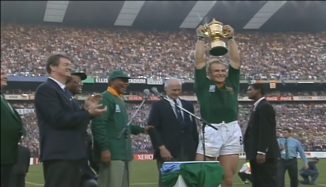
As with all international sport, some nations excel while others don’t. While South Africa struggles to strike it big in association football, they remain one of the finest Rugby nations.
The “Rugbywêreldbeker 1995” was the first international sporting event since the end of apartheid, before which South Africa was banned from competing. The team, known as the Springboks, went undefeated in the group stage and won 15-12 in the final, beating Australia, Romania, Canada, Western Samoa, and France on the way. Joel Stransky, the fly half, scored a drop goal in extra time to win the match.
What happened after the match has become an iconic moment in the history of the sport. Nelson Mandela, godfather to captain Pienaar’s children, wearing a Springbok rugby jersey and cap, presented the Webb Ellis Cup to Pienaar to the delight of the capacity crowd. Pienaar said that they won the trophy for all 43 million South Africans, and later told the Guardian that he felt the country changed forever after the final whistle. (1995)
123 years ago today, the shoe salesman Chuck Taylor was born in Indiana. While playing basketball in high school, Taylor began wearing the Converse All-Star shoe introduced way back in 1917.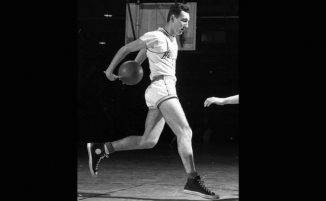
He became such a fan that he approached the company for a job, and traveled across America selling the shoes at basketball clinics he organized. He became so successful in promoting the shoes that he won an 80% share of the entire sneaker industry. He also fine-tuned its design to improve the performance on the court by added a reinforcing ankle patch. Converse was so impressed, they added his signature “Chuck Taylor” to that patch with their star logo in 1932. The All-Stars sneakers, simply known as ‘Chucks,’ became the most successful basketball shoe in history, with 800 million pairs sold.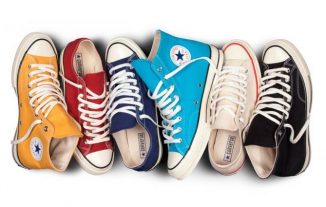 In 1936, Taylor designed the white Chuck Taylor All-Star high-top, with its patriotic red and blue trim, for Team USA as they headed to the first-ever Olympic basketball tournament, held in Berlin (where they took home gold). Once technological advancements caused the shoes to become obsolete for sports, people began buying the canvas unisex sneakers because they were fashionable. Converse heeded the call and began making Chucks in a rainbow of colors. (1901)
In 1936, Taylor designed the white Chuck Taylor All-Star high-top, with its patriotic red and blue trim, for Team USA as they headed to the first-ever Olympic basketball tournament, held in Berlin (where they took home gold). Once technological advancements caused the shoes to become obsolete for sports, people began buying the canvas unisex sneakers because they were fashionable. Converse heeded the call and began making Chucks in a rainbow of colors. (1901)
And on this day in 1947, Kenneth Arnold reported the first known sighting of UFOs after flying over Washington and seeing nine luminous disks in the form of saucers.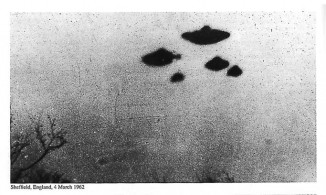
Coincidentally, this is also the day when the US Air Force released its report, in 1997, “closing” the investigation of the so-called Roswell Incident, which concluded that the alien bodies witnesses reported seeing in 1947 were actually life-sized test crash dummies.
And, on this day in 1948, the Soviet Union deliberately refrained from stopping a massive humanitarian airlift led by American, British, and French flyers over West Berlin, after they instituted the cruel ‘Berlin Blockade’ attempting to cut off all inroads to the city.
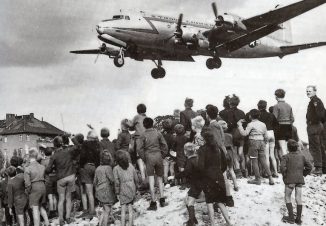
For nearly a year, more than a quarter million flights delivered thousands of tons of food and fuel to the otherwise strangled German city, which was surrounded by 1.5 million Soviet military troops.
5,000 tons of food, coal, and liquid fuel were required each day to sustain the two million people. Despite the Germans having been the sworn enemy of the West just three years earlier, the merciful airlift gained popular support and was called “America’s greatest humanitarian mission”.
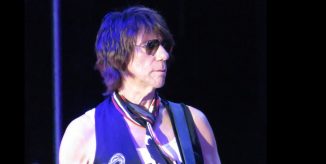
80 years ago today, the “guitarist’s guitarist” Jeff Beck, was born. As a British teenager, he learned to play on a borrowed guitar and made several attempts to build his own instrument, first by gluing and bolting together cigar boxes for the body and a fence post for the neck.
As one of the most influential lead guitarists in rock, he was ranked fifth on Rolling Stone’s list of the ‘100 Greatest Guitarists of All Time’. Two of his early solo LPs released in the 1970s, Blow by Blow and Wired, were both instrumental and certified platinum. Jeff Beck has won eight Grammys, including four for his 2010 LP Emotion and Commotion. WATCH him play Nessun Dorma, one of the Grammy-winning performances… (1944)
144 years ago today, Canadians heard the first performance of O Canada, the song that would become the national anthem. Originally called “Chant national,” it was written in Québec City by Sir Adolphe-Basile Routhier (words in French) and composed by Calixa Lavallée, who was apparently so excited when he completed it that he forgot to sign the manuscript. First played in Québec at The First Congress on the French Language in Canada, the country didn’t move to officially make it the national song until a century later.
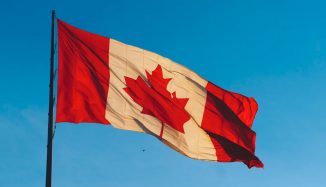
The best-known English-language version, because people never liked the direct French translation, was written by attorney Robert Stanley Weir in 1908, but amended several times over the years. It became one of the favorite anthems played at Olympic and athletic stadiums, with its triumphant ending, “O Canada, we stand on guard for thee.” WATCH a stunning rendition created during lockdown by the Westcoast Harmony Chorus… (1880)
O Canada! Our home and native land!
True patriot love in all thy sons command.
With glowing hearts we see thee rise,
The True North strong and free!
From far and wide, O Canada,
We stand on guard for thee.
God keep our land glorious and free!
O Canada, we stand on guard for thee.
O Canada, we stand on guard for thee.
SHARE the Milestones, Memories, and Music…





















[…] By Good News Network […]